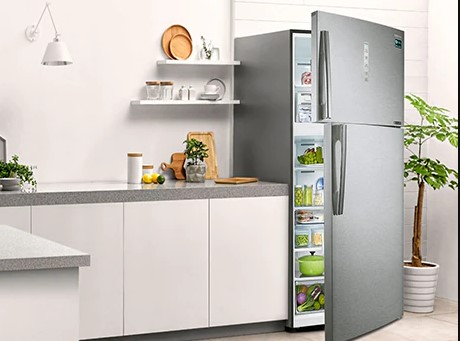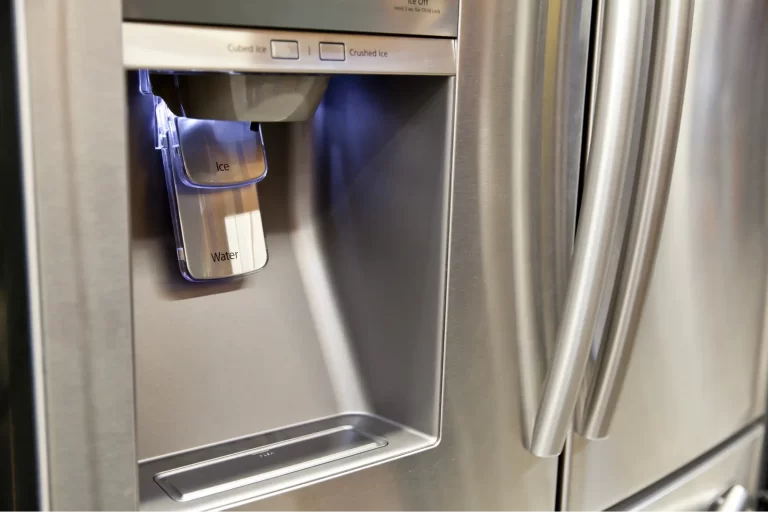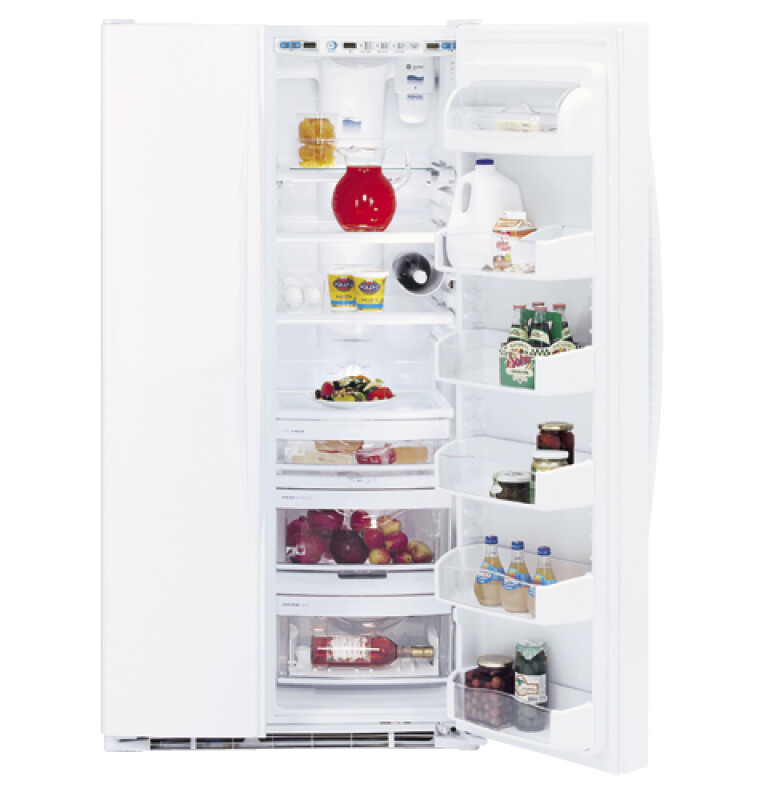You’re enjoying a quiet evening at home when suddenly you hear it: a loud humming noise emanating from your kitchen. Upon investigation, you discover that the culprit is none other than your Samsung refrigerator. This article serves as your comprehensive guide to addressing this issue promptly, preserving the lifespan and functionality of your appliance.
A loud humming noise from your Samsung refrigerator may indicate a problem with the compressor, fans, defrost timer, or ice maker. Other issues could be refrigerant leaks, loose parts, or a faulty drain pan, water inlet valve, or thermostat. These problems typically require cleaning, repositioning, or part replacement.
Quick Troubleshooting Guide
| Issue | Symptom | Fix |
| Compressor Noise | Humming or buzzing noise | Ensure room temperature is within recommended range and clean the condenser coils. |
| Fan Noise | Humming or whirring sound | Check for obstructions and clean the fans. If faulty, replace them. |
| Defrost Timer Noise | Clicking or buzzing noise | Consider replacing the defrost timer if it’s malfunctioning. |
| Ice Maker Noise | Humming, buzzing, or clicking sounds | Check the water inlet valve and ensure the ice maker components are functioning. Call a professional if needed. |
| Refrigerant Leak | Hissing or gurgling noise | Contact a professional technician to handle the refrigerant. |
| Loose or Broken Parts | Rattling sound | Inspect your refrigerator for loose or broken parts and tighten or replace as necessary. |
| Drain Pan Noise | Vibration or noise | Check the drain pan for cracks and ensure it’s correctly positioned. |
| Water Inlet Valve Noise | Buzzing or chattering sound | Check the water supply to the refrigerator. If sufficient, consider replacing the water inlet valve. |
| Damper Control Assembly | Noise, especially when it opens and closes | Consider replacing the damper control assembly if it’s broken or stuck. |
| Temperature-Control Thermostat | Ticking sound | If adjusting the temperature doesn’t solve the issue, consider replacing the thermostat. |
Understanding Your Noisy Refrigerator
Before we dive into the specifics of resolving this issue, it’s crucial to understand why your Samsung fridge might be making noise. Appliances, like refrigerators, have several components, and any of these could cause humming, buzzing, or other noises.
Common culprits often include the compressor, the fan, the defrost timer, or the ice maker. Each of these parts has a vital role to play in your fridge’s operation, and any malfunction could lead to a change in the sounds your refrigerator makes.
10 Potential Causes for Your Samsung Fridge Making Noise

1. Compressor Noise
The compressor is the heart of the refrigerator’s cooling system and can sometimes produce a humming or buzzing noise. This is often the result of the refrigerator working harder than usual due to high room temperature, or a buildup of dust around the condenser coils, causing poor heat transfer.
Fix: Ensure the room temperature is within the recommended range (generally between 60-80 degrees Fahrenheit), and clean the condenser coils.
2. Fan Noise
The refrigerator has two fans – the evaporator fan and the condenser fan. If either of them is malfunctioning, it may lead to a humming or whirring sound.
Fix: Check for obstructions and clean the fans. If the fan is faulty, consider replacing it.
3. Defrost Timer Noise
The defrost timer switches the refrigerator between cooling and defrost modes. If it’s faulty, it can produce a clicking or buzzing noise.
Fix: Consider replacing the defrost timer if it’s malfunctioning.
4. Ice Maker Noise

If your Samsung refrigerator has an ice maker, it can produce a variety of sounds, such as humming, buzzing, or clicking. This is often due to a valve issue or problems with the ice-making cycle.
Fix: Check the water inlet valve for issues, and ensure the ice maker components are functioning properly. In some cases, professional repair may be required.
5. Refrigerant Leak
Refrigerant leaks can cause a hissing sound or a gurgling noise. This can also affect the cooling performance of the refrigerator.
Fix: If you suspect a refrigerant leak, contact a professional technician. Dealing with refrigerant requires special training and equipment.
6. Loose or Broken Parts
Over time, screws can become loose, and certain components may break or deteriorate, causing a rattling sound.
Fix: Inspect your refrigerator for loose or broken parts and tighten or replace as necessary.
7. Drain Pan Noise
The drain pan can sometimes vibrate or make noise if it’s not properly placed or if it’s cracked.
Fix: Check the drain pan for cracks and ensure it’s correctly positioned.
8. Water Inlet Valve Noise
The water inlet valve can cause a buzzing or chattering sound if it becomes defective or is not supplied with enough water.
Fix: Check the water supply to the refrigerator. If the supply is sufficient, consider replacing the water inlet valve.
9. Damper Control Assembly
The damper control assembly regulates the cold air flow from the freezer to the refrigerator. If it’s broken or stuck, it may produce a noise.
Fix: Consider replacing the damper control assembly if it’s broken or stuck.
10. Temperature-Control Thermostat
The temperature-control thermostat directs voltage to the compressor, fan motors, and defrost heater. If it’s not working correctly, it can cause a ticking sound.
Fix: If adjusting the temperature doesn’t solve the issue, consider replacing the thermostat.
These are just some of the reasons why your Samsung refrigerator might be making noise. If you’ve checked all these potential causes and are still hearing unusual sounds, it’s best to contact a professional for assistance.
A step-by-step guide to basic troubleshooting:
- Unplug the refrigerator: This is always the first step in any troubleshooting guide for safety reasons.
- Check if your refrigerator is level: Sometimes, an unlevel refrigerator can cause the internal components to shift, causing noise.
- Inspect for blockages: Blocked vents or a buildup of dust can cause your refrigerator to work harder, leading to increased noise.
- Identify the noise source: Try to figure out which part of the fridge the noise is coming from. This can help you isolate whether the noise is due to the compressor, fan, defrost timer, or ice maker.
Check Out: Samsung refrigerator not making ice but water works
Effective Noise Solution for Samsung Refrigerator
- Fixing a Noisy Compressor: The solution can range from soundproofing the area around the fridge to professional help.
- Resolving Fan Issues: This can involve clearing obstructions or replacing the fan for a quieter operation.
- Addressing Defrost Timer Noise: This might require a replacement of the defrost timer or professional assistance.
- Solving Ice Maker Problems: This includes a series of steps to troubleshoot common issues with the ice maker.
When to Seek Home Appliance Repair for Your Refrigerator Noise

While many of the problems causing your Samsung refrigerator to make noise can be fixed with simple at-home solutions, there are times when professional help may be necessary. If the noise continues after you’ve attempted basic troubleshooting and isolated the issue to a specific component, it might be time to seek professional Samsung appliance support.
Failure to seek professional help when necessary can lead to more serious issues. For example, a noisy compressor left unattended can escalate into a compressor failure, which can cost up to $1,000 to replace according to HomeGuide.
Maintaining a Quiet Samsung Fridge
The best way to prevent future noise issues with your Samsung refrigerator is through regular cleaning and maintenance. It’s recommended to clean your fridge, including its coils and fans, every 3-6 months. This routine maintenance can help prevent dust build-up, which can cause your fridge to work harder and result in increased noise.
Moreover, always follow the user manual instructions that come with your Samsung refrigerator. Proper use of your appliance can reduce stress on its components, minimizing the potential for noise and increasing the overall lifespan of the fridge.
Interesting Read: Samsung refrigerator water dispenser not working
FAQs
Is it normal for my Samsung refrigerator to make some noise?
Yes, it’s normal for refrigerators to make certain noises. These sounds can come from the compressor when it’s running, the water valve when it’s filling the ice maker, or the fans when they are circulating air. However, if you notice loud, unusual noises like humming, buzzing, or clicking, it might be an indication of a problem that needs troubleshooting.
What is the first step I should take when my Samsung refrigerator starts making unusual noises?
Start by performing some basic troubleshooting. Unplug the refrigerator for safety reasons, check if your refrigerator is level, inspect for any blockages or dust buildup, and try to identify the specific part of the fridge the noise is coming from.
How often should I clean my Samsung refrigerator to prevent noise issues?
It’s recommended to clean your fridge, including its coils and fans, every 3-6 months. Regular maintenance helps prevent dust buildup, which can cause your fridge to work harder and result in increased noise.
Can I fix a noisy Samsung refrigerator by myself, or should I call a professional?
Many common issues causing refrigerator noise can be fixed at home, like checking for blockages, cleaning, or minor adjustments. However, if the problem persists after basic troubleshooting, or if it involves potentially complex parts like the compressor or refrigerant, it’s advisable to call a professional technician.
Why does my Samsung refrigerator noise stop when I open the door?
When the refrigerator door is open, certain parts like the fan typically stop working, hence the noise may stop. If the noise stops when you open the door, the cause might be an obstructed fan, a faulty door seal, a noisy compressor, or obstructed vents.
Conclusion
Dealing with a Samsung refrigerator making a loud humming noise can be an annoying experience, but understanding the potential causes can equip you with the knowledge to address the issue promptly. This not only ensures the quiet operation of your appliance but also prolongs its lifespan, providing you with many more years of excellent service.






